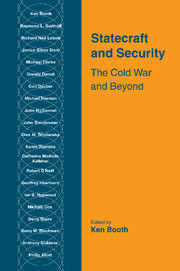Conclusion: security within global transformation?
Published online by Cambridge University Press: 06 October 2009
Summary
So far in the 1990s many of us feel, like Stephen Spender and others at the start of the 1930s, ‘hounded by external events’ (Hynes, 1976: 65). The speed and confusion of contemporary world politics delay the construction of historical meaning, and make simplification attractive, while coping with the present pushes out planning for the longer-term future. It may of course simply be end-of-century gloom; after all, this is not the first time people have complained about incompetent and visionless governments, the collapse of traditional institutions, widespread social and economic distress, appalling disparities in life chances, racism and hypernationalism, private comfort replacing public ideals, and introspection triumphing over internationalism, corruption over service and helplessness over hope. In terms of mood we have been here before, but something is new. The present of world politics is unique in terms of its material conditions: a wired world, a threatened environment, a global population surge, a truly world economy, depleting nonrenewable resources, and intercontinental weapons of mass destruction. The mood hints at the meaning: ‘Resignation sums up the Distant Past's vision of the future; hopefulness was that of Yesterday; and apprehension is the dominant mood of Today.’ These words of Robert Heilbroner (1995: 69–70) neatly encapsulate the cultural, social and political stage in world history in which the chapters of this book are set.
- Type
- Chapter
- Information
- Statecraft and SecurityThe Cold War and Beyond, pp. 338 - 355Publisher: Cambridge University PressPrint publication year: 1998
- 2
- Cited by



